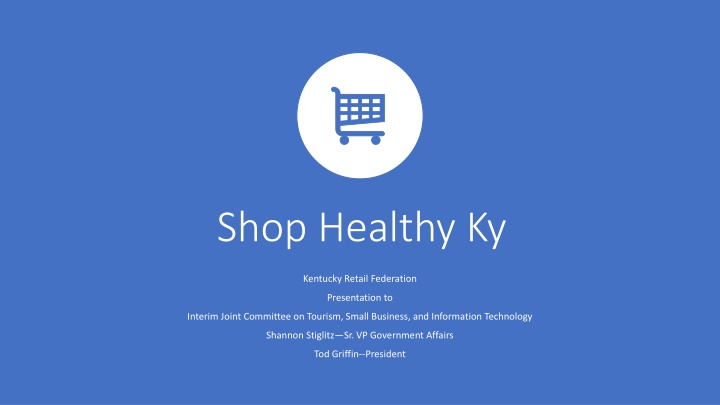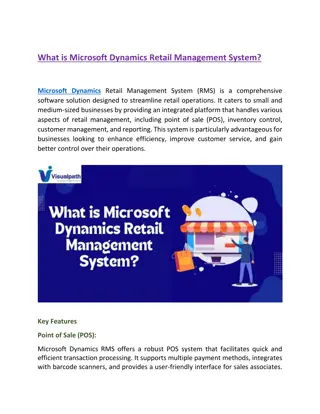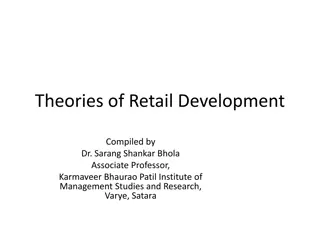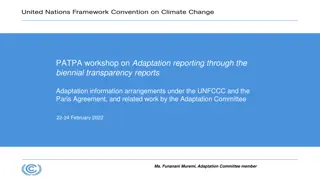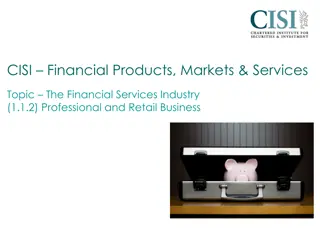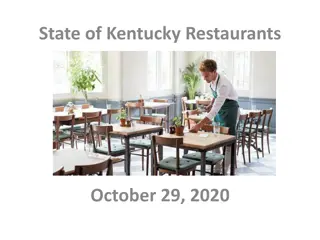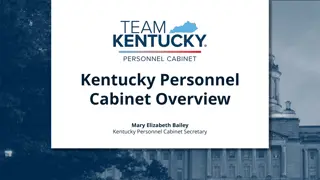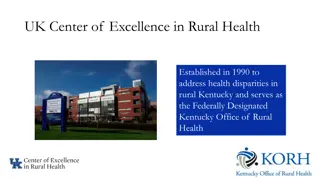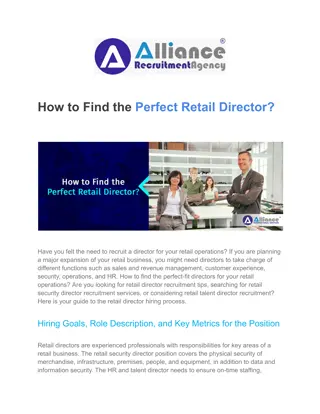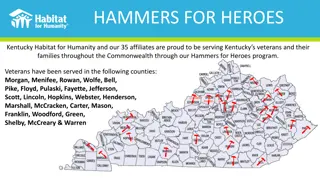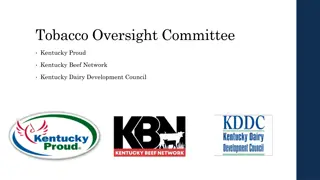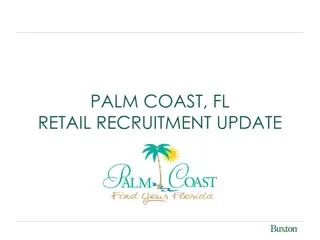COVID-19 Impact on Kentucky Retail Federation: Resilience and Adaptation
Kentucky Retail Federation shared their experience navigating the challenges brought by the COVID-19 pandemic, emphasizing essential retail determinations, product shortages, and retailers stepping up to support employees and communities.
Download Presentation

Please find below an Image/Link to download the presentation.
The content on the website is provided AS IS for your information and personal use only. It may not be sold, licensed, or shared on other websites without obtaining consent from the author.If you encounter any issues during the download, it is possible that the publisher has removed the file from their server.
You are allowed to download the files provided on this website for personal or commercial use, subject to the condition that they are used lawfully. All files are the property of their respective owners.
The content on the website is provided AS IS for your information and personal use only. It may not be sold, licensed, or shared on other websites without obtaining consent from the author.
E N D
Presentation Transcript
Shop Healthy Ky Kentucky Retail Federation Presentation to Interim Joint Committee on Tourism, Small Business, and Information Technology Shannon Stiglitz Sr. VP Government Affairs Tod Griffin--President
Kentucky Retail Federationwho are we Traditional Retail Grocery Agribusiness Stores Propane Pharmacies Restaurants Convenience Stores Vending Machines
KRFs experience navigating COVID-19 Pandemic No one was prepared for managing business closures, health concerns, product shortages, executive orders, local orders and health department rules. Our members worked quickly to provide protection for employees Senior hours for customers vulnerable to COVID- 19 Encouraging curbside service Learning new shopping practices Self-enforced capacity limits Coordination with governor s office Childcare for essential workers COVID-19 Pandemic and Retail
Essential Retail Determinations for what is essential? CISA List Grocery Hardware Stores Pharmacy Propane Convenience Stores Farm supply stores COVID-19 Pandemic and Retail
Product Shortages Price Increase meat prices Local Ordinances Executive Orders PPE sourcing and purchasing Health department enforcement of essential retail orders COVID-19 and Retail
COVID-19 and Retailers Stepping Up Kroger agreed to let employees wear gloves and masks, and will be installing plexiglass guards at checkout to protect cashiers; restricted the number of customers in the store at one time company-wide; increased workers wages $2 an hour; put signage up throughout the store additional resources through the Kroger Family of Companies Helping Hands fund to provide financial assistance to associates who face hardship due to COVID-19, including lack of access to childcare and for those considered higher-risk; and announced a $3 million commitment to rapidly deploy hunger-relief resources to communities disproportionately impacted by the coronavirus (COVID-19) pandemic; Food City announced $3 million in bonuses to employees; Wal Mart Providing masks and gloves for employees; limit five customers per 1,000 square feet, about 20% of capacity; The US retail giant has also pledged $25 millionto support organizations that are working on finding ways to detect, manage, and prevent the virus, as well as non-profits that are supporting the most vulnerable; Target Limited number of customers and guiding shoppers through store to move them quickly; provided masks and gloves to employees; has pledged $10 million to help various local, national, and global organizations during the coronavirus crisis. It has promised to give $1 million to its most impactedemployees, $5 million to state and community nonprofits supporting local populations, $3 million to national nonprofits such as Feeding America, and $1 million to global organizations such as UNICEF. Texas Roadhouse CEO and Founder Kent Taylor said he would forego his salary this year to pay employees; some locations selling ready-to-grill steaks Meijer Special hours set aside for front-line workers Home Depot Extending return policies to 180 days; Suspended seasonal sales and advertising; check workers temperatures before starting shifts; Paying full-time employees a $100 a week bonus and part-time employees a $50 a week bonus Lowe s Increased wages; closing on Easter; using a new app so store personnel can monitor foot traffic; increased space for customers using order online and pick up options Marathon and Speedway Donated 500,000 PPE items Walgreens expanding drive thru services, and planning to expand drive thru testing Several smaller stores, located in areas not serviced by major retailers, have also adapted their procedures with curbside delivery, taking cards over the phone to minimize contact. Kroger, Walmart, Home Depot, Target, Lowes provide additional pay and sick leave
Increased Drive thru options Testing through Executive Order Enhanced Delivery of Medications DOI suspends PBM audits Allow for dispensing of 30-day supply of medications COVID-19 and Pharmacy Challenges for Pharmacy: Reimbursements Healthcare providers PPE Supplies
Kroger testing program Walmart testing program Walgreens testing program COVID-19 Testing All of these are open and free to the public in certain communities State pays for laboratory services Retailers provide supplies and staff to run drive-thru testing program
KRF submitted a plan for reopening retail businesses deemed non-essential. We established principles for reopening based on the experience of essential retailers Key Principles to Reopening: Protect our Community Flexibility in safely reopening Clear Expectations for Employees and Customers Statewide Guidelines Coordination and Collaboration Reopening Retail
One suggestion to ensure that enforcement is properly being administered is to develop a statewide appeal process for businesses issued closure orders. Currently, there is no such remedy for retailers leaving these businesses without due process or a mechanism to seek such a remedy. It has left businesses trying to navigate a complicated web of regulations from local governments, local health departments and other state agencies. In many instances, KRF has assisted these retailers in seeking a remedy but it is not a quick process and can leave the business closed and employees sent home, even if they were properly following the guidelines. Retail Reopening
Patchwork quilt of state and local regulations: The greatest frustration of essential retailers today is the patchwork quilt of guidance and enforcement of social distancing requirements and other Executive Orders. The EOs allow multiple agencies to enforce orders and oftentimes they give conflicting guidance or guidance that does not meet the EO requirements. We would strongly encourage preemption of city and county ordinances as part of the reopening process. In addition, an appeals process should be established for businesses to refute closure orders as there is currently no process in place. Retail Reopening
Jobs Website Sourcing of PPE, cleaning supplies, etc. Daily COVID-19 Newsletter Small Business Administration Conference Call on Paycheck Protection Program Development of Shop Health Ky Campaign KRF Resources for Retailers
Shop Healthy Ky Campaign https://www.kyretail.com/shophealthyky
Thank you, General Assembly! Passed SB 150 Allowed Restaurants to sell alcohol by the package Allowed Restaurants to sell to-go alcohol by the drink Allowed Restaurants to sell raw foods and grocery items Restaurants
Challenges: Guidance and reopening communications Social distancing and capacity limits Loss of customer base Access to PPE Patchwork quilt of guidance Barriers to reopening to 50% Paycheck protection program Restaurants
Clear communications and expectations statewide Appeals process for businesses Improvements Clear Lines of communications with public health officials Collaboration Development of Business Committee within state government
Thank you Shannon Stiglitz Sr. Vice President of Government Affairs sstiglitz@kyretail.com Conclusions and Questions Tod Griffin KRF President tgriffin@kyretail.com
